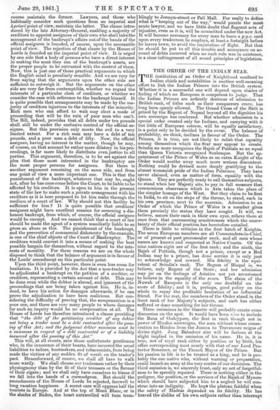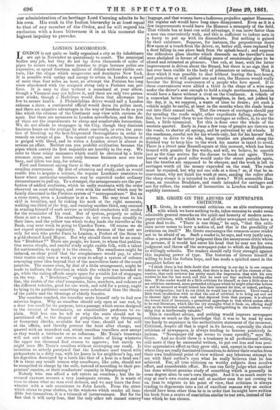THE ORDER OF THE INDIAN STAR. T HE institution of an
Order of Knighthood confined to Indian chiefs and notabilities is another well-meaning effort to link the Indian Princes into the British system. Whether it is a successful one will depend upon shades of feeling of which no European is competent to judge. That the Indian Princes are ardently desirous of admission to British rank, of titles such as their conquerors crave, has long been openly allowed. The Grand Cross of the Bath is prized by the Regent of Nepaul beyond all the dignities his own sovereign has conferred. But whether admission to a special order created only for Indians, and carrying with it but little of European esteem, will be equally satisfactory, is a point only to be decided by the event. The balance of probability, we think, inclines in favour of the Order. The Princes, it is true, are not likely to relish that equality among themselves which the Star may appear to create. Scindia no more recognizes the Rajah of Puttiala as an equal than Queen Victoria recognized Soulouque. But the ap- pointment of the Prince of Wales as an extra Knight of the Order would soothe away much more serious discontent. Nothing could be devised more deeply- gratifying to the almost womanish pride of the Indian Palatines. They have never claimed, even as matter of form, equality with the Queen. They are perfectly ready to call themselves subjects, to stand when her Majesty sits, to pay in full measure that ceremonious observance which in Asia takes the place of the simpler homage of the West. But they claim to be first in India, to sit on the steps of the throne, to stand, each in his own province, next to the suzerain. Admission to an Order of which the Prince of Wales is a member gives them precisely the status they have .sought. It will, we believe, secure their rank in their own eyes, relieve them at once from that unreasoning sensitiveness which the uncer- tainty of their official position has heretofore entailed. There is little to criticize in the first batch of Knights. The seven European members are all Commanders-in-Chief, or of present or past proconsular rank, and all men whose names are known and respected at Native Courts. Of the nine natives eight are of the first rank; and the ninth, the Rajah of Puttiala, though not a prince, except as a Red Indian may be a prince, has done service it is only just to acknowledge and reward. His fidelity is the equi- valent of Scindia's rank. The Begum of Bhopal is, we believe, only Regent of the State ; and her admission may jar on the feelings of Asiatics not yet accustomed to believe in the equality of the sexes. The claim of the Nuwab of Rampore is the only one doubtful on the score of fidelity ; and it is, perhaps, good policy on the whole to repay the profitable hesitation of an influential friend. For the rest, the members of the Order stand in the front rank of her Majesty's subjects, and each has either suffered or done something for her throne.
Three omissions in the Gazette will probably create some discussion on the spot. It would have been wise to include the Rana of Oodeypore, the first in rank though not in power of Hindoo sovereigns, the man without whose conse- cration no Hindoo from the Jumna to Travancore reigns of divine right. Jung Bahadoor also will be furious at the slight implied in the omission of his name. He is, it is true, not of royal rank either by position or by birth, his office corresponding most nearly with that of our Lord Pro- tector Somerset, or the French Mayor of the Palace. But his passion in life is to be treated as a king, and he is pro- bably the one native who, without warning or preparation, could launch an army at the very centre of our dominion. The third omission is, we sincerely trust, only an act of forgetful- ness to be speedily repaired. There is nothing either in the pedigree, the position, or the services of the Rajah of Mysore which should have subjected him to a neglect he will con- strue into an indignity. He kept the plateau faithful when the safety of Madras depended on its fidelity. He has braved the dislike of his own subjects rather than interrupt our administration of an heritage Lord Canning admits to be his own. His rank in the Indian hierarchy is at least equal to that of any member of the Order, and he will regard his exelusion with a keen bitterness it is at this moment the highest impolicy to provoke.































 Previous page
Previous page